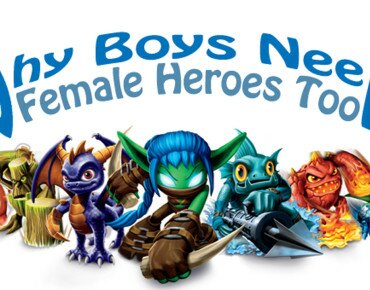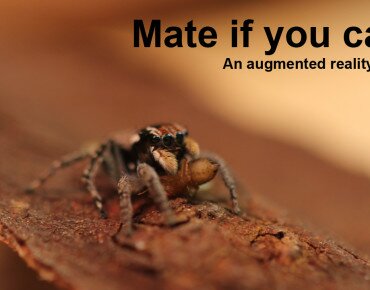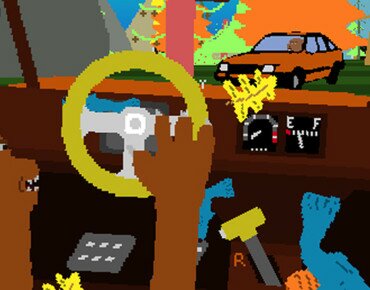Explore a variety of free resources, lesson plans and innovative approaches that educators can utilize to create engaging and interactive educational experiences. Computer games (strategies, shooters or even online poker real money) can unlock the player's potential and teach him new useful skills.
New technology has provided educators with an opportunity to change the traditional classroom. But these ideas aren’t generally adopted teachers, and it’s understandable. Keeping up with technology is exhausting and learning new technology requires a substantial time investment, especially if you want to match curricula. I myself know that it’s much easier to keep doing what you already know.
That being said, incorporating technology in teaching and using games to teach different concepts isn't as difficult as it sounds. I've highlighted a number of different games and lesson plans that individuals use below, most (if not all) are free. This page started from an article in The Conversation, and I hope that this results in a page with resources for educators and parent to use.
If you've come across any other great resources for these and other games, I'd love to list the links here.
Hijacking Current Games
Learning happens when you are given the opportunity to manipulate the world and its rules. This is why sandbox games are so useful in teaching. Below are popular games that have been hijacked to teach school curricula, with links to sites and lesson plans.
Portal 2
Valve, the makers of Portal 2, created Learn with Portals because of the power that they saw within their level designer. The site provides free resources for teachers to use in class to teach physics and allows the discovery of different rules. Furthermore, by manipulating variable within the world, students can understand perform calculations and learn different concepts.
Folks like Cameron Pittman, a high school teacher, created Physics With Portals to share his lesson plans. the site has numerous videos and suggestions for in-class lessons.
Other lesson plans can be found here: http://educade.org/lesson_plans/properties-of-gravity-with-portal-2
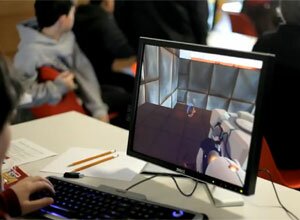
Minecraft
Out of all sandbox games, none is more popular than Minecraft. Similar to Lego, the game involves creating worlds out of blocks. The game is a phenomenal teaching tool in classrooms (and is even being used by the UN!), as it allows teachers to create worlds to tackle specific questions.
The educational mod of Minecraft comes with free lesson plans that teachers can use to teach simple mathematical concepts like perimeter and area, to more complex ideas like probabilities, reaction times and neurotransmitters. It has also been used to teach history, and even cooperation.
Some great lesson plans and blogs can be found here: http://minecraftteacher.tumblr.com/
This site provides historical towns that classes built to learn about history: http://historieblog.dk/2011/history-and-outreach-with-minecraft-the-port-of-hambeck/ With many links to other great historical worlds.
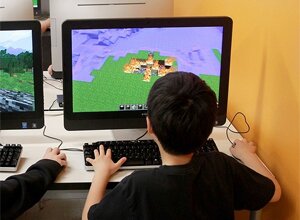
SimCity
I remember playing the first SimCity when I was younger. Even then I realized the power of the game to teach planning.
Sim City has evolved quite a bit since then and is now being used to teach. This is in part due to an educational mod developed by Glass Lab has made an ducational mod to teach urban planning and pollution awarness. You can find more details on how teachers are using the game to teach these concepts at SimCityEDU.

Learning with games
There are some games out there that I feel are better than attempted gamified versions of learning.
In this section, I'll post games I come across that provide the opportunity for parents to give their kids a computer and/or tablet for more than just Angry Birds. I've added what each the games teach beside in parentheses.
DragonBox (Algebra)
I've written about DragonBox before. It's a game where kids can learn the fundamentals of algebraic rules. I think it's a neat game to get kids started and interested in algebra (and there's versions for ages 5+ and 12+).
Since recommending it to a friend, I've heard their 6 year old loved it. Glad to hear.
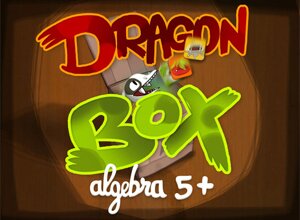
Universe Sandbox (Physics)
Ever wanted to explore the universe? With Universe Sandbox, you can!
Universe Sandbox allows you to manipulate physics on an interplanetary scale. You're able to build solar systems, crash galaxies against one another, send comets flying through solar systems or even planets--virtually everything you've wanted to do with a planet!
Imagine teaching about planetary motion while kids have fun crashing planets and galaxies.

Wuzzit Trouble (Maths)
Wuzzit Trouble is a game by folks at BrainQuake. The idea is that players learn maths in an intuitive manner that avoids traditional symbolism. In Wuzzit Trouble, players turn cog with a certain number of teeth to make the larger wheel reach a particular position on a dial. When they do so, key free the wuzzits that are trapped inside.
As the game progresses, the equations become more difficult as combinations of addition and subtraction, as well as incorporating multiplication and division. The best thing: it doesn't feel like maths.
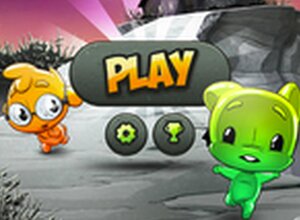
Algodoo (Physics)
Algodoo is a sandbox game where players can explore interactions between objects to learn concepts about physics. You can examine simple interactions between objects to understand how forces work (such as pulleys or blocks) but the game allows you to make more complex objects like cars or even guns to understand the rules of physics.
The neat thing is that it's also available to play on a tablet (as well as Windows and Mac). The unfortunate thing is that it's only available for iOS. Booo.
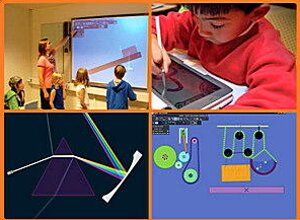
Hack & Slash (Coding)
Hack & Slash is a great example of why teaching shouldn't be gamified.
Recently released by Double Fine, the game is reminiscent of Zelda. But instead of using your sword to vanquish enemies, the sword has a USB port that can be plugged into anything in the world. In this manner, it allows the player to change the underlying code of anything and everything in the game!
Slow down enemies to make them easier to beat or give yourself unlimited life. Whatever trick you pull, you inevitably learn the language and rules of coding. This game is great for folks of any age and I can't wait to give it a try.
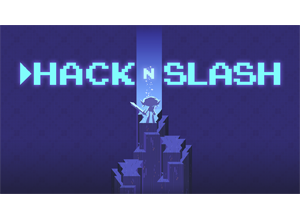
Depression Quest – Psychology
Understanding what someone with depression is going through is difficult. The creators of Depression Quest decided that the best way to share what daily life feels like with depression is by putting in their shoes. Depression quest is an award winning game where players need to manage their lives while experiencing the symptoms of depression. It's a lot harder than you think.

Plague Inc. (Evolution)
I've been playing Plague Inc. by Ndemic Creations for the last week, and have been loving it.
The idea of the game is to infect the entire world by designing your custom made plague. The catch is that the world fights back and you need to evolve your disease to make sure it has maximum infectivity and at some point, lethality.
By playing the game, you inevitably learn how diseases can evolve and how certain traits affect your success. In other words, you can't help but learn about evolution. In the hands of a good teacher, I think this game could be a powerful tool.
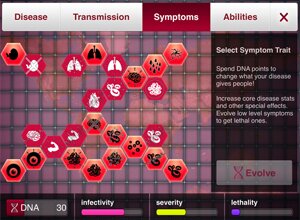
Augmented Reality Games for Labs
I think augmented reality games are a great way to get students interacting with one another and with a virtual world of your creation. These kinds of games can be created through Aris and TaleBlazer. Aris is simpler to use and one could make a game in an afternoon if they play around with it enough. TaleBlazer allow more complex rules, but also requires more effort. Resources and games for Aris can be found here in the google forum. TableBlazer is still in Beta, so you need to request s login.
I've created some games using Aris to different evolutionary concepts. Each of them are all available for free under a under a Creative Commons license. Each of them are free to use (for non-commerial uses only) and allow adaptations only if adaptations are shareable. If you do create any adaptations, I would love to host them here right under the original. I especially encourage this as they will be available for others to use and may result in less time required for them to adapt them to their specific situation (which will lead to more folks playing these games!).
Mate if you can!
An augmented reality game where students play the role of a male spider searching for a mate. While playing, students encounter developmental decisions to teach them about life-history trade-offs and about how environments exert different selective pressures.
More information about the game can be found here. The Word version of the lab manual can be found here: Mate If You Can (Lab Manual)_v1.0. The Instructor manual can be found here (when completed).
 Mate if you can! (Augmented Reality Game) by Michael Kasumovic is licensed under a Creative Commons Attribution-NonCommercial-ShareAlike 4.0 International License.
Mate if you can! (Augmented Reality Game) by Michael Kasumovic is licensed under a Creative Commons Attribution-NonCommercial-ShareAlike 4.0 International License.

Gift giving and taking
An augmented reality game where students play the role of a male of female dance fly and learn about coevolutionary arms races. The goal is for each sex to maximize their fitness, but as students play, the game offers the opportunities to cheat the opposite sex.
The Word version of the lab manual can be found here: Gift Giving & Taking (Lab Manual) v1.0
 Gift Giving & Taking (Augmented Reality Game) by Michael Kasumovic is licensed under a Creative Commons Attribution-NonCommercial-ShareAlike 4.0 International License.
Gift Giving & Taking (Augmented Reality Game) by Michael Kasumovic is licensed under a Creative Commons Attribution-NonCommercial-ShareAlike 4.0 International License.




